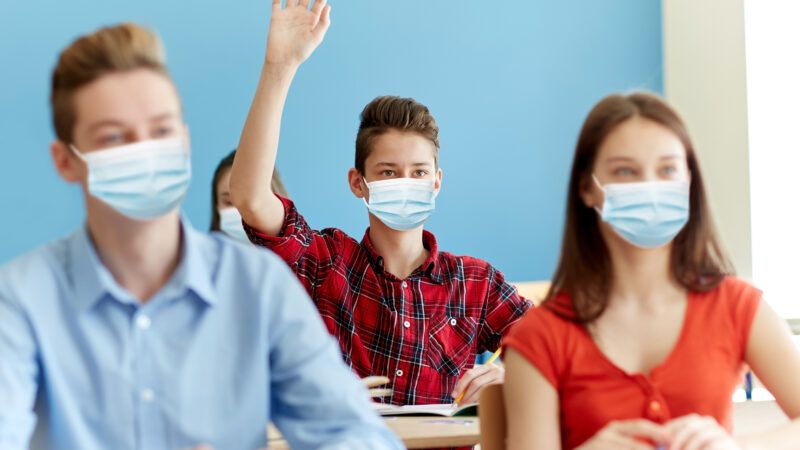College Campuses Have the Craziest COVID-19 Restrictions of All
Here's why that should terrify the rest of us, too.

Last week, Brown University implemented strict new COVID-19 mitigation protocols following 82 confirmed positive (including asymptomatic) cases among students.
Until the number of cases decreases, students are forbidden to gather in groups of more than five, whether indoors or outdoors. They are no longer permitted to eat in the cafeteria, and must instead pick up their meals and eat elsewhere, keeping a mask on at all other times. But they can't go out to eat at bars or restaurants; this is strictly prohibited. The university doesn't want students to mingle with anyone from outside the campus, but administrators would also prefer if students declined to make new friends among their peers.
"Students are expected to consistently engage with the same small social group, rather than attending or 'hopping' among multiple small-group gatherings over the course of a day or short period of time," according to the university.
Students will also be tested every four days.
It should be noted that the overwhelming majority of Brown University teachers, staff, and students are vaccinated. Vaccination is a requirement. Since vaccines offer excellent protection against severe disease and death, COVID-19 outbreaks at Brown are unlikely to seriously harm anyone.
"On a campus where the vast majority of students and faculty are fully vaccinated, I think the university should instead return to something near-normal," one student, Adam Shepardson, told Campus Reform.
This is a reasonable expectation. Campus environments, where the populace skews younger and the vaccination rate is 90-plus percent, are ideal places to ease into the post-pandemic reality: They are extremely safe from the threats of mass death and crowded hospitals. University authorities would be well-advised to treat the diminishing threat of COVID-19 as an opportunity to lift restrictions, ease up on masking, and let students enjoy the social and educational experiences they're paying for.
Instead, something close to the opposite is happening: Far from returning to normal at an accelerated rate, many colleges are implementing some of the most authoritarian mitigation efforts out of anywhere in the country. Harvard has encouraged students to keep "close contacts to a minimum" and wear masks at all times; Yale instructed students to wear masks in their own dorm rooms if any friends are visiting; the University of Southern California prohibited all indoor eating and drinking and asserted that if students need to hydrate during class they should first leave the building.
"The exception to this rule is limited to instructors, who may briefly hydrate while teaching but must re-mask immediately," said the dean of USC's law school in an announcement.
In an effort to completely disrupt illicit socializing, Columbia reprogrammed key cards so that they would only grant access to students' individual residence halls. The campus is currently in the midst of a "temporary" two-week ban on hanging out with other people.
Guidance from campus administrators is often authoritarian in tone. Boston University's recent missives to students emphasize the need for obedience to random testing requirements and warn that serious punishment will occur "should you fail to become compliant."
Journalist Michael Tracey has been tracking COVID-19 restrictions on campuses and notes that many administrators are creating vast surveillance networks to keep students in line. "University of Michigan requires all students/staff and visitors to acquire the 'ResponsiBLUE' app which reveals their vaccination status and 'health screening' results," he writes. "This must be presented on command when entering facilities. There's every indication it will be made permanent."
One might have expected students to rebel against these measures: Many campuses contain a loud and active contingent of injustice-minded protesters. But if young people at Columbia, Harvard, and elsewhere are fed up with mandatory masking and social distancing, they certainly aren't saying so. In fact, some students seem to be eagerly reporting each other for COVID-19 noncompliance. And at campuses where the mitigation efforts are less militant, students have actually protested the lack of enforcement. University of Iowa students recently held a "die-in" to demand that the administration pause "all non-essential in person events" and implement a mask mandate.
This is madness. Few people are safer from COVID-19 than vaccinated 18- to 22-year-olds, yet campus administrators (and sometimes students) are acting like any amount of non-masking or basic socializing is likely to get people killed.
I've written quite a bit about cultural trends in higher education, and how the illiberal values of campus activists have come to dominate all professional spaces where elite opinion holds sway. Progressive young people who view basic free speech principles with antipathy or even disdain are in the process of fundamentally changing the workplace. "We should look to the campus activist culture of the present to discover what our broader culture might resemble a few years from now," I wrote in a recent article for the Deseret News.
If recent history is any guide, we should be terrified that the current crop of college students might leave campus possessed of the notion that the most insane version of pandemic oppression is perfectly normal and desirable.


Show Comments (186)